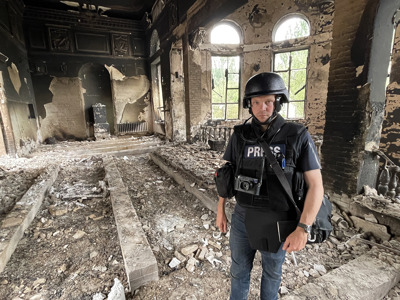
Jerome Starkey
The Sun
Time and again he gave Sun readers searing eye-witness accounts that cut through the blizzard of hearsay and uncertain truths. But he also went much further, delivering a string of stand-out scoops. He exposed Russian war crimes, including a cluster bomb strike in eastern Donbas. He brokered exclusive access to a Russian prisoner of war camp, joined Ukraine’s Special Forces on a raid to arrest a suspected collaborator, and acquired exclusive drone photographs of a Russian tank graveyard inside Russian soil. Together, these powerfully written frontline dispatches and hard-hitting exclusives drove The Sun’s coverage streaks ahead of its competitors. He achieved this over many months by enduring the daily, indiscriminate bombardment of civilian areas – in Kharkiv in the north, across Donbas in the east and in Mikolaiv and Kherson in the south. On the second day of the war, when much of the world’s reporting still came from hotel rooftops, Jerome was on a snow-swept frontline in northern Kharkiv as soldiers took cover from shelling after stopping a Russian tank assault. On Easter Sunday, two months later, he filmed of a Russian “double tap” rocket strike that targeted medics and first responders as the treated wounded civilians in a city street. Pro-Russian bloggers said the iPhone clip must be fake because no one could stay outside and film if rockets were landing so nearby. Altogether, Jerome’s films have been viewed more than 14 million times and are powerful vignettes of ground truth which have enriched his written reports and helped The Sun reach huge new audiences, becoming the biggest non-broadcaster news publisher on YouTube globally. There are few clearer cases of public interest journalism than risking one’s life in a war zone to document the horrors for readers at home. Jerome’s skill was channelling that experience into hard-hitting and gripping reports for Sun readers. Amid an echo-chamber of rumours and deliberate attempts to subvert the truth, Jerome and his colleagues – photographer Peter Jordan, translator Oleksii Kulyk and security advisors Martin Jones and Jake Bilbie – provided a potent antidote. Together they told stories which might otherwise not have been told. Their resolve and resilience, their rigour and skill, uncovered Russian war crimes and exposed Ukrainian suffering and courage. They went above and beyond to hold power to account and give voice to soldiers and civilians caught up in this awful conflict.